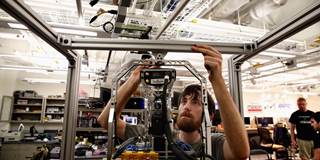Economists have long examined the factors determining whether someone becomes an inventor, and they have generally found that the best step aspiring innovators can take is to be born to the right parents. But new research suggests that household income may be masking the influence of other related factors.
PARIS – Who becomes an inventor? Ideally, it would be anyone with a natural talent for innovation. But what if talent in innovation is misallocated, because some potential inventors are deprived of the conditions for success? After all, in addition to natural endowments, much depends on one’s social environment, and not every potential inventor is afforded the same level of education or parental support.

PARIS – Who becomes an inventor? Ideally, it would be anyone with a natural talent for innovation. But what if talent in innovation is misallocated, because some potential inventors are deprived of the conditions for success? After all, in addition to natural endowments, much depends on one’s social environment, and not every potential inventor is afforded the same level of education or parental support.